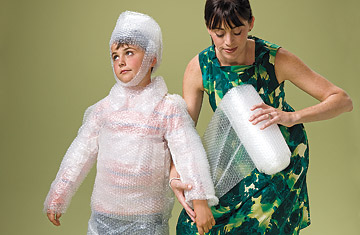When well intended parents make mistakes

Parenting is one of the most difficult
and rewarding jobs around.
The ultimate goal of parenting is (or at least should be) to raise children well so they are prepared to leave our houses and live on their own.
However, a parenting trend that has become more common is stymieing their development. That is “helicopter parenting” or over parenting. Helicopter parenting is a form of over parenting in which parents apply overly involved and developmentally inappropriate tactics to their children who are otherwise able to assume adult responsibilities and autonomy.
A few examples include, following your children on the playground “in case” they get hurt or need help, making sure it’s “safe” to play outside in front of their house, and completing assignments or projects for them.
We have all seen the amazing Valentine boxes that begin in preschool; these elaborate boxes that likely took their parents hours to complete...and left no room for the child’s imagination or independence to take place.
"In short, a helicopter parent is one who hovers over their child's every move in an effort to protect them from pain, disappointment, and failure in the process of achieving success."

This type of parent is especially prevalent in western culture because...
Overly Focused on Self-Esteem?
Over parenting seems to have taken force as parents become concerned with children’s self-
esteem. To build their self-esteem, parents tell them how great and special they are, coddling
them from doing anything too difficult or potentially dangerous. Therefore, it’s important to
discuss briefly the development of self-esteem.
Self-esteem develops from being loved and secure as well as developing competence. For children to develop self-esteem they must be able to make decisions and accomplish tasks on their own. One way to foster this would be to assign age appropriate chores, letting them make decisions (what to wear, what sport or instrument to play, etc.).
Encourage your child to say, “I’ll try” rather than “I can’t.” As your child meets new challenges, the more competent and confident he/she becomes.
Properly Developing The Mindset...
In addition to developing self-esteem, researcher Carol Dweck has found that helping children
(and adults) develop an ability coined growth mindset sets them up to be better achievers.
Mindset is essentially our beliefs about learning and intelligence. When children are taught that intelligence is malleable, they understand that effort makes them stronger.
Also, teacher and parent feedback can either encourage a child to choose a challenge and increase achievement or look for an easier way out.
Studies on different kinds of praise have shown that telling children they are smart encourages a fixed mindset which often leads to avoidance of difficult or challenging tasks.
However, when children are praised for hard work and effort, they develop a growth mindset. With a growth mindset, children take on challenges and learn from them which increases their abilities and achievement.
How To Fix These 3 Issues...
The question becomes what we can do to create confident and high achieving children and later adults. Below are some tips to consider:
1. Let them experience risk:
A skinned knee from falling off a bike or a fall off the monkey bars can actually help your child in the long run. Let them experience their abilities and then improve them.
Allow them to play outside and walk home from school without constant adult supervision. They may just surprise you in what they are willing and able to accomplish.
2. Let them fail:
Parents can be too quick to rescue their kids.
Let them fail now when they are children and learn how to recover from mistakes.
Don’t do their homework or projects for them, let them experience this small failure and learn how to recover from a mistake. Failing a class in school now is far better than not knowing how to cope when they lose a job or don’t get hired.
3. Give purposeful praise:
We have gotten to a place in society where we reward mediocrity and adopted an “everyone gets a trophy” mentality.
Instead, praise their hard work and effort. Be there to provide empathy when they lose or get rejected but let them feel their feelings. Loss is hard, but a very important part of development.
4. Consider slowing down:
Children’s schedules have become quite busy. It is not unusual to see a child participating in three different activities at once.
These over scheduled children have little time to decompress or play or heaven forbid get bored. Boredom is a wonderful thing...it allows for creativity (if we don’t interrupt it).
If you have questions or would like to discuss this topic further, you can contact Dr. Kristin Rose at DrRose@RoseTherapyCenter.com
Reading material and websites to consider:
Carol Dweck - https://www.mindsetworks.com/default
Authors of The Coddling of the American Mind book: https://www.thecoddling.com/
